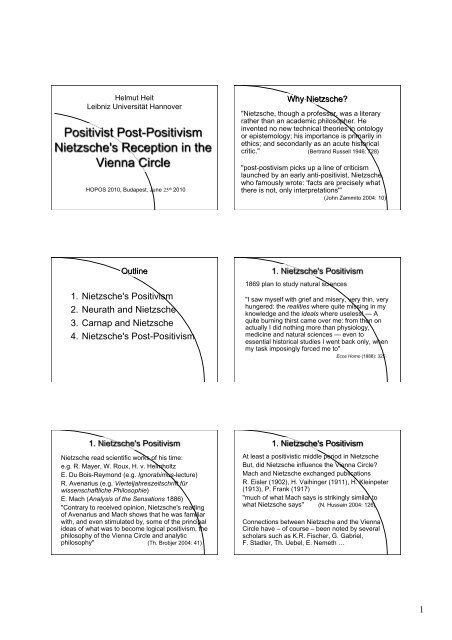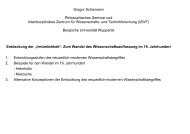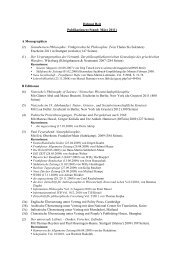N Vienna Circle 2010 - Berliner Nietzsche-Colloquium
N Vienna Circle 2010 - Berliner Nietzsche-Colloquium
N Vienna Circle 2010 - Berliner Nietzsche-Colloquium
Create successful ePaper yourself
Turn your PDF publications into a flip-book with our unique Google optimized e-Paper software.
Helmut Heit<br />
Leibniz Universität Hannover<br />
HOPOS <strong>2010</strong>, Budapest, June 25 th <strong>2010</strong><br />
1.� <strong>Nietzsche</strong>'s Positivism<br />
2.� Neurath and <strong>Nietzsche</strong><br />
3.� Carnap and <strong>Nietzsche</strong><br />
4.� <strong>Nietzsche</strong>'s Post-Positivism<br />
<strong>Nietzsche</strong> read scientific works of his time:<br />
e.g. R. Mayer, W. Roux, H. v. Helmholtz<br />
E. Du Bois-Reymond (e.g. Ignorabimus-lecture)<br />
R. Avenarius (e.g. Vierteljahreszeitschrift für<br />
wissenschaftliche Philosophie)<br />
E. Mach (Analysis of the Sensations 1886)<br />
"Contrary to received opinion, <strong>Nietzsche</strong>'s reading<br />
of Avenarius and Mach shows that he was familiar<br />
with, and even stimulated by, some of the principal<br />
ideas of what was to become logical positivism, the<br />
philosophy of the <strong>Vienna</strong> <strong>Circle</strong> and analytic<br />
philosophy" (Th. Brobjer 2004: 41)<br />
"<strong>Nietzsche</strong>, though a professor, was a literary<br />
rather than an academic philosopher. He<br />
invented no new technical theories in ontology<br />
or epistemology; his importance is primarily in<br />
ethics; and secondarily as an acute historical<br />
critic." (Bertrand Russell 1946: 728)<br />
"post-postivism picks up a line of criticism<br />
launched by an early anti-positivist, <strong>Nietzsche</strong>,<br />
who famously wrote: 'facts are precisely what<br />
there is not, only interpretations'"<br />
(John Zammito 2004: 10)<br />
1869 plan to study natural sciences<br />
"I saw myself with grief and misery, very thin, very<br />
hungered: the realities where quite missing in my<br />
knowledge and the ideals where useless! — A<br />
quite burning thirst came over me: from then on<br />
actually I did nothing more than physiology,<br />
medicine and natural sciences — even to<br />
essential historical studies I went back only, when<br />
my task imposingly forced me to"<br />
Ecce Homo (1888): 325<br />
At least a positivistic middle period in <strong>Nietzsche</strong><br />
But, did <strong>Nietzsche</strong> influence the <strong>Vienna</strong> <strong>Circle</strong>?<br />
Mach and <strong>Nietzsche</strong> exchanged publications<br />
R. Eisler (1902), H. Vaihinger (1911), H. Kleinpeter<br />
(1913), P. Frank (1917)<br />
"much of what Mach says is strikingly similar to<br />
what <strong>Nietzsche</strong> says" (N. Hussain 2004: 126)<br />
Connections between <strong>Nietzsche</strong> and the <strong>Vienna</strong><br />
<strong>Circle</strong> have – of course – been noted by several<br />
scholars such as K.R. Fischer, G. Gabriel,<br />
F. Stadler, Th. Uebel, E. Nemeth …<br />
1
"Now we could do methodically what many<br />
researchers from the beginning of the 19 th century<br />
had already practically achieved in individual cases<br />
and subsequently aimed for as a whole: the<br />
exhaustive description of the sciences. What the<br />
supporters of the <strong>Vienna</strong> <strong>Circle</strong> under the influence<br />
of Mach, Avenarius, Poincaré, Duhem, Abel Rey,<br />
Enriques, Einstein, Schröder, Frege, Peano, Hilbert,<br />
Russell as well as James and <strong>Nietzsche</strong> and others<br />
had proposed individually could be coordinated<br />
from now on"<br />
Neurath: The development of the <strong>Vienna</strong> <strong>Circle</strong> (1936): 697<br />
"One has to admit that, in 1928, when Carnap<br />
published his 'Pseudo Problems' for the first time,<br />
irrationalism under the label of 'revival of<br />
metaphysics' was gaining ground in a threatening<br />
manner. Namely in Germany, under the influence<br />
of the works of Schopenhauer, <strong>Nietzsche</strong>, Eduard<br />
von Hartmann, Bergson, Klages and others, a<br />
renunciation from the objectivity of reason, yes, a<br />
hostility towards reason becomes visible in the<br />
writings and other documents of the public<br />
consciousness"<br />
G. Patzig Afterword to Carnaps Pseudo Problems 1969: 94<br />
Carnap read some <strong>Nietzsche</strong> and acknowledges<br />
mutual agreement in philosophical issues:<br />
<strong>Nietzsche</strong> did serious historical-empirical work<br />
<strong>Nietzsche</strong> found the right form to address the<br />
metaphysical ambition<br />
<strong>Nietzsche</strong> is no "musician without musical ability"<br />
"With Carnap, so to speak, Frege's Begriffsschrift<br />
lies on the desk and <strong>Nietzsche</strong>'s Zarathustra on the<br />
bedside table" (G. Gabriel)<br />
1.� Did Carnap take <strong>Nietzsche</strong> serious?<br />
2.� Did he had an influence on Carnap's philosophy?<br />
�� Disrespect against academic philosophy<br />
�� Respect for contemporary science<br />
�� Findings in Psychoanalysis and Behaviourism<br />
�� Severe criticism of metaphysics<br />
�� Critique of Kant ("the Essay-Philosopher showed<br />
Kant's anti-scientific attitude" - 1938, p. 882)<br />
�� Critique of religion and ethics on the basis of<br />
historical and empirical considerations<br />
�� Defense against right-wing adoption (Anti-<br />
Spengler - 1921)<br />
�� but 1945 Neurath has <strong>Nietzsche</strong> on a list of<br />
problematic authors (together with Spengler)<br />
Carnap does not count <strong>Nietzsche</strong> among the 'new<br />
metaphysicians' in his Pseudo Problems.<br />
To the contrary, he writes elsewhere:<br />
"A large part of his work has predominently empirical<br />
content. We find there, for instance, historical<br />
analysis of specific artistic phenomena or an<br />
historical-psychological analysis of morals. In the<br />
work, however, in which he expresses most strongly<br />
that which others express through metaphysics or<br />
ethics, in Thus Spoke Zarathustra he does not<br />
choose the misleading theoretical form, but openly<br />
the form of art, of poetry"<br />
Carnap (1931) The Elimination of Metaphysics: 80<br />
1. Example: Theories of Meaning:<br />
"(Meaningful) statements are divided into the<br />
following kinds. First there are statements which<br />
are true solely by virtue of their form ('tautologies',<br />
according to Wittgenstein …)"<br />
"With respect to all other statements the decision<br />
about truth or falsehood lies in the protocol<br />
sentences. They are therefore (true or false)<br />
empiricial statements and belong to the domain of<br />
empirical science"<br />
Carnap (1932): The Elimination of Metaphysics … p.76<br />
("It is altogether impossible to make a statement<br />
that expresses a value judgement" ibid.: p. 77)<br />
2
"Is language the adequate expression of all<br />
realities? Only due to forgetfulness can men ever<br />
come to belive: he possesses truth to such a<br />
degree. If he will not be content with truth in the<br />
form of tautology, i.e. with empty covers, he will<br />
ever only buy illusions for truths. What is a word?<br />
The representation of a nerve-stimulus in sounds.<br />
To conclude from the nerve-stimulus to a cause<br />
outside us is already the result of a wrong and<br />
unjustified application of principle of causation"<br />
<strong>Nietzsche</strong> (1872): Beyond Truth and Lie in the<br />
extramoral Sense p. 875<br />
What is "the Given" in the constitutional system?<br />
"The 'Given', that is the experiences themselves in<br />
their totality and closed unity" The "Elementary<br />
experiences – Elementarerlebnisse" (1928: 67)<br />
"The result is: in the world of epistemic objects<br />
there are (as in any domain insofar it could be<br />
ordered) unlimitedly many forms of ordering, but<br />
only one, unified form of the to-be-ordered, the<br />
elements" (1928: 162)<br />
Elementary experiences comply with elements<br />
We should establish a scientific worldview<br />
Philosophy can only help to clarify our language<br />
"we invent most parts of our experiences and we can<br />
hardly be forced to watch any process not as an<br />
'inventor'. This all will say: we are essentially, since<br />
ancient times – used to lying. Or, to put it more virtual<br />
and hypocritical, say more convenient: You are much<br />
more an artist than you know".<br />
Beyond Good and Evil (1886): 113f<br />
Physiology (Helmholtz, Gestaltwahrnehmung)<br />
Language: Coping, not Copying (Gerber)<br />
Explanation: anthropomorphic projection (Hume, Mach)<br />
2. Example: Critique of Dualism and the given I:<br />
"The I-relation is no original feature of foundational<br />
elements, of the Given (…) Those theories are the<br />
victim of a prejudice, for which mainly language is<br />
responsible and its subject-verb-form of<br />
sentences"<br />
Carnap (1928): The Logical Structure of the World §65<br />
"The existence of the I is no element of the Given.<br />
sum does not follow form cogito" (ibid.: §163)<br />
Reference to Avenarius, Natorp, Schlick et.al. and<br />
<strong>Nietzsche</strong>'s The Will to Power (§ 276, 304, 309 …)<br />
(cf. <strong>Nietzsche</strong> BGE § 17: "grammatical custom")<br />
<strong>Nietzsche</strong> as a critique of Positivism:<br />
"Opposing positivism, who stands still at the<br />
phenomena 'there are facts only', I would say:<br />
No, precisely facts is what there is not, only<br />
interpretations. We can not fix a fact in itself: it<br />
is probably irrational to aim for something like<br />
that." Nachlass (Frühjahr 1887): 7[60]<br />
Difference between Logical Positivism and<br />
textbook-notions of the "received view"<br />
<strong>Nietzsche</strong>'s interpretational Perspectivalism is<br />
opposed to Logical Positivism<br />
"that all Interpretations so far are perspectival<br />
evaluations, by means of which we succeed<br />
living – this goes through my works. The world,<br />
insofar as it concerns us, is wrong i.e. is no<br />
matter of fact but a poetic work and up rounding<br />
of a marginal sum of observations"<br />
Nachlass (Herbst 1885-Herbst 1886) 2 [108]<br />
Against the Myth of the Given:<br />
Experience is an active process and contains of noneliminable<br />
subject-sided moments<br />
The measure is not truth or contemporary science<br />
but aesthetic judgements and 'life'<br />
18<br />
3
"Given that this is also an interpretation only<br />
– and you will be eager enough to object<br />
that? – well, even better. —"<br />
Beyond Good and Evil (1886): 37<br />
Thank you very much!<br />
Helmut.heit@tu-berlin.de<br />
4




